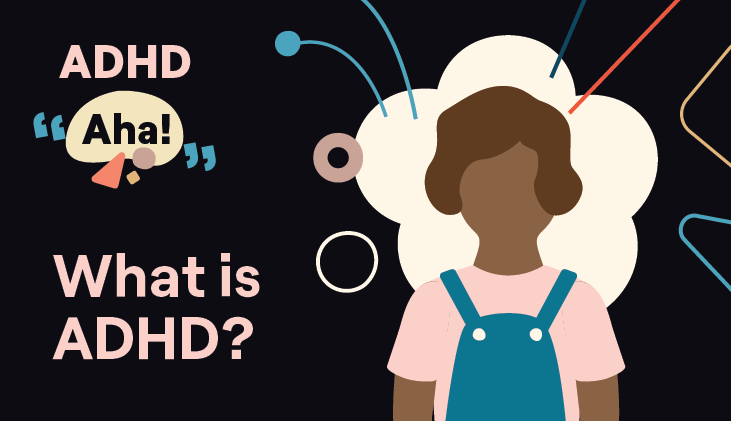Stay in the know
All our latest podcasts delivered right to your inbox.
You’ve heard our guests’ stories about their ADHD symptoms…but what exactly is ADHD? A bunch of listeners have asked for an ADHD explainer. So this episode, we’re doing something different. The best explanation of ADHD we’ve ever heard comes from clinical psychologist and ADHD expert Dr. Thomas Brown. We’re posting the audio of the YouTube video he did with Understood here, along with some commentary from host Laura Key.
Dr. Brown defines ADHD, shares relatable and detailed examples of ADHD symptoms, and explains the ADHD brain. We hope you enjoy — and that it’s helpful.
Related resources
Episode transcript
Laura: From the Understood Podcast Network, this is "ADHD Aha!," a podcast where people share the moment when it finally clicked that they or someone they know has ADHD. My name is Laura Key. I'm the editorial director here at Understood. And as someone who's had my own ADHD "aha" moment, I'll be your host.
Hi everybody. For this episode, we're going to break from our usual format. Typically on "ADHD Aha!," you'll hear from people about their experience with ADHD symptoms, when and how they noticed them, and how their attitudes about ADHD have changed. But some listeners have requested an ADHD explainer. They want an answer to the question "What is ADHD?" on our show. By the way, big thank you to all the listeners who've left comments and written in. I'd love to hear from more of you. You can email us at ADHDAha@understood.org or rate us and leave us a review on Apple Podcasts. Tell your friends. But I digress.
So when we were thinking about how to make an explainer about this complex topic, I realized that we didn't need to create one from scratch. Understood already has so much content about ADHD, and there's one video in particular that's really resonated for a lot of people. In the video, which you can find on our YouTube channel, Understood expert, Dr. Thomas Brown, breaks down everything you need to know about ADHD. This video really gets to the heart of what ADHD is, what causes it, and what it looks like.
Dr. Brown is a clinical psychologist who specializes in, among other things, the assessment and treatment of adolescents and adults with ADHD. He has a very long and impressive resume, and hearing him speak before I got diagnosed with ADHD was instrumental in helping me understand what was going on. It's fair to say that his words have sparked lots of mini "aha" moments for me.
So I wanted to share the audio here for you all. I'll be popping in and out with some quick thoughts here and there, but overall, I hope this is helpful and that you enjoy
Tom Brown: What we know as ADHD, attention-deficit hyperactivity disorder, or some people still call it ADD attention-deficit disorder, has been recognized by some doctors since way back in 1902. But from 1902 until 1980, it was all about little boys who couldn't sit still, couldn't shut up, and were driving everybody nuts. It was just behavior problems.
The name of the disorder was changed a number of times, and there were different formulations. But it was all about behavior problems. Since 1980, which is when they first changed the name of the disorder to include the words, "attention deficit," we've realized that this is not so much a behavior problem, but far more a problem with the brain's management system, its executive functions.
And we also learned that there are many people who have ADHD who've never had any significant behavior problems. And that even for those who have, that's usually the least of it. It's the attention problems that tend to make more trouble for people, particularly as they get a little bit older and more is expected of them for being able to manage themselves.
One thing that's important to be clear about from the very beginning is that ADHD has nothing to do with how smart a person is. There're some people who have this who are like super, super, super smart. Others, high average, middle average, low average, slow. I treat people for this who are like university professors and doctors and lawyers and big shots in business.
A lot of people who are regular folks, some people have trouble doing the basics. It can be anything along the IQ spectrum and still have ADHD — has nothing to do with how smart you are. The other thing to know is that this is a problem, a set of problems, that include a wide range of characteristics. And what I'd like to do today is to describe for you some of the characteristics of what we call ADHD, give some examples of them. And then talk a little bit about what we know about what's involved in the brain in the course of ADHD.
One of the main things that people with ADHD complain about is they have trouble staying tuned. That when they're listening or reading or working on something, they get part of it, but then it sort of drifts off and then they're back and then they drift off and it drifts off again. And then they're back. They have difficulty staying tuned. It's similar in a way to the problem you have with a cell phone, where you're in an area where you don't have good reception. You can get part of it and then the message keeps fading in and out.
The other thing is that they often have a problem with being distracted. Like anybody else, they see and hear things that are going on around them. They have thoughts going through their head. But most people, if they have something they've got to focus on, can push that stuff out of the way and focusing on what they've got to do. People with ADHD, it's real hard for them to do that.
You know, there'll be sitting in a classroom trying to listen to what's going on, or perhaps there'll be in a meeting or sitting down and trying to read something or write something. And somebody drops a pencil and they have to sort of check and see where did the pencil go. And then there'll be back on task again for a couple of minutes, then they're thinking about some TV show they saw the night. And then they're back on task again for a minute. And they're thinking about some conversation they had with somebody two hours ago. And then they're back on task again for a few minutes, and then they're looking out the window. Like anybody else will from time to time, but they're likely to sit and watch the squirrel go up the tree a little longer than somebody else and be checking out the traffic and the cloud formation, the guy who's mowing the lawn, then they're back on task again for a few minutes. And they'll be thinking about what they're going to do when this is over and how soon is this thing going to be over, anyhow? I've got things I've got to do, and what I'm going to have for supper tonight? I wonder what's on TV tonight.
All these things are coming in all at one time. It's almost like you're trying to watch TV and got four different stations all coming in at the same time, at the same on one channel. And it gets kind of hard to separate the signal from the noise. But the thing that's puzzling about this, that really makes it very difficult for people to understand is: for people who have ADHD, it's like that almost all the time, but not always. Everybody I've ever seen who has ADD — and that's a lot of people — has a few things they can do where they have no trouble paying attention, no trouble focusing.
Let me give you an example: 16-year-old boy I saw. He was the goaltender for school's ice hockey team. And it just happened that the day his parents brought him in to see me was the day after his team had just won the state championship in ice hockey. So they're bragging a little bit at the beginning about how great he was in the tournament the day before. And apparently he was a very good goalie. They said when he's out there playing hockey, he missed nothing. He knew where the puck was every second of a fast game. Totally on top of it. The kind of goalie every team wants. Smart kid. tested way high up in the superior range. Wanted to get good grades, was hoping to go to medical school, but he was always in trouble with his teachers.
And what they say to him is, you know, once in a while you'll say something that shows how smart you are. We'll be talking about something, you'll come in with some comment that's really very perceptive and it's quite impressive. But most of the time you're out to lunch. You're looking out the window, you're staring at the ceiling. You look like you're half asleep half the time. You don't even know what page we're on. And the question they kept asking him was if you can pay attention so well when you're playing hockey, how come you can't pay attention when you're sitting in class?
Here's another example. A lot of times parents will bring in kids for me to see and they'll say, no, the teacher says this kid can't pay attention for more than five minutes. We know that's not true. We have watched her play video games and she can sit and play those video games for three hours at a time and not move. And the teacher said she's easily distracted. That's nonsense. When she's playing those games, she's locked on that screen like a laser. And the only way you're going to get her attention is to jump in her face or turn off the TV. So again it's like you can do it here. Why can't you do it there?
Now it's not always sports or video games. There's some people with ADHD, they're not good at that stuff. They might be into art and they're sketching and drawing and really getting into it. Somebody else when they're little, they're creating engineering marvels with Lego blocks. And then when they're older, they're taking car engines apart and putting them back together or designing computer networks. But everybody I've ever seen who has ADHD has a few things they can do where they have no trouble paying attention, even though on almost everything else, they've got a lot of trouble paying attention.
And if you ask them about it, say what's with this, how come you can do it here? And you can't do it here, here, and here? Usually what they'll say is it's easy. If it's something I'm interested in, I can pay attention. If not, I can't. And most people hear that and they say, yeah, right, congratulations. That's true for anybody. Anybody's going to pay attention better for something they're interested in than for something they're not, which is true. But here's the difference. People who don't have ADHD, if they've got something they've got to do and they know they've got to do it, and it's important, they can usually make themselves pay attention, even if it's pretty boring, just because they know they have to do.
People with ADD, it is incredibly difficult for them to be able to make themselves pay attention. Unless the task is something that's really interesting to them — not because somebody told them it ought to be interesting, but just because it is interesting to them, for whatever reasons. Or if they feel like they have a gun to their head and something very unpleasant is going to be happening very fast if they don't take care of this right here right now, under those two conditions, no problem. They can focus very well. Anything else, it's really difficult for them to focus.
But the problem is this is not something that's under voluntary control. It makes it look like it's a problem with willpower. If you can do it here, why can't you do it here, here, and here? But it's not a problem with willpower. It's a problem with the way the brain is wired. All the characteristics of ADHD, which I'm going to be describing here, are things everybody has trouble with sometimes. It just people with ADD have a lot more trouble with it.
So in that sense, ADHD is not an all-or-nothing deal like pregnancy, with you are pregnant or you're not pregnant. And there's nothing in between. It's more like depression where everybody gets bummed out once in a while. But just because somebody is unhappy for a couple of days doesn't mean we're going to diagnose them as clinically depressed. It's only when those depressive symptoms are persistent and pervasive and making a lot of trouble for me to say, yeah, that's the depression. We gotta do something about it.
So all the characteristics of ADHD are problems everybody has sometimes. It's just with people who have ADD, they just have a lot more difficulty with it more of the time. And the problem is it is not under voluntary control. It's not something you can do with willpower.
Laura: And I'm back. I'm just popping in for a second to say that, that last thing Dr. Brown said about ADHD is something I reiterate a lot on this podcast. The difficulties that ADHD causes are things a lot of people deal with sometimes. But people with ADHD have a harder time with them and deal with them more often.
This is where ADHD mythmaking comes in. People think, well, everyone has trouble with focus sometimes. Everyone gets fidgety or distracted. ADHD is just an excuse. But it's not that simple. It's about the frequency and intensity of symptoms. This might be why guests on this podcast, like Olivia and Jeannie, felt like they were lazy before they realized it was ADHD making things more difficult for them.
Let's hear some more specific examples of how ADHD symptoms play out.
Tom Brown: Well, let me tell you about some of the other things which we see with people with ADHD. One is they often have trouble getting organized and getting started on things. For many, it's difficulty organizing their stuff. Their backpack, their desks, their notebooks, their filing system, their living space, bigger mess than most other people most of the time, unless somebody else is helping them take care of it. Other people have no trouble at all with their stuff. They have a lot of trouble with their time and their work. And what they'll tell you is if I have a bunch of stuff to do at one time, it's really hard for me to look at it and say, OK, that should be first. That should be second. That should be third.
But even when they get their priorities straight, which often doesn't happen, they tend to have a lot of difficulty getting started. Another piece of it that you often hear about from people with ADHD, is they'll say they have a lot of difficulty in regulating their sleep and their alertness, and being able to keep up the effort to finish things in a reasonable time. Many complain that they have trouble getting to sleep. And what they'll tell you is I often stay up a lot later and I really want to, or should, because I found if I try to go to bed before I'm really, really exhausted, I just can't shut my head off. I just keep thinking of stuff. And so I stay up late reading, watching TV, surfing the net or whatever, until I'm just exhausted. Then I fall asleep fine. But the problem then is I tend to sleep like a dead person, and I have a hard time resurrecting myself in the morning. And if I don't have somebody around to help me get myself out of bed in the morning, I'm very likely to be late to whatever it is I'm supposed to do or possibly sleep through the whole thing and just keep hitting the snooze button or just turn the clock off all together.
During the day, they're usually all right. as long as they're on their feet, moving around or talking a lot. If they have to sit still for very long to listen or to read or do paperwork, yeah, that'll start getting kinda heavy. Another thing that often happens as a problem with people with ADHD is they have trouble staying with a task that they may have started reasonably well, but they have a hard time then keeping up the effort to finish it in a reasonable time.
I had a track star from the university, a runner who came into my office one day and he said, my mind is a great sprinter, but it's a lousy distance runner. He said, if the task I have to do is something you do in one quick chunk, you just go all out for it and then you're done with it, I'm fine. But if it's something where you can't do it in one quick chunk, it's a longer-term project, you have to have to keep chipping away at a day after day, I have more trouble with. My approach then is either hurry up, slap dash, get the thing done. Or why don't we just set this aside and wait until it becomes a little more of an emergency?
Everybody has trouble with deadlines sometimes. People with ADD, it's almost like they can't get started until it's becoming an emergency. Another thing that often persons with ADHD have trouble with is writing. I'm not talking about penmanship now. I'm talking about taking ideas and putting them into sentences and paragraphs, because what people will say is often I've got a lot of ideas for what I should write for this essay I'm supposed to write or for this term paper, but it just takes me half of forever to be able to get the sentences and paragraphs put together so they make sense. They have difficulty organizing their thoughts and being able to get the words out in a reasonable way.
Another piece of this, it's not part of the official diagnostic criteria for ADHD, but it's certainly something that a lot of people with ADHD are concerned about and complain about, is that many times they have difficulty managing their emotions.
I need to give you a few examples, because it's not the same for everybody. Salesmen I saw at one time came in and said, you know, I was in a diner yesterday, late afternoon, having a lunch. I'm in a pretty good mood sitting there eating my sandwich. Guy in the booth behind me gets his sandwich. He's chewing too loud. It's going chomp, chomp, chomp. He said there was something about that noise was driving me nuts. It was as though a computer virus had gotten into my head and just gobbled up all the space. And that's all I could think about was that noise. I'm sitting with my fist clench, seriously, thinking about getting up and smacking this guy in the mouth because he's chewing so obnoxiously loud.
He said, I didn't do it. I didn't want to get arrested. But if I'd been at home, I would've been yelling at somebody or walked out of the room. He said that it was strange because after a few minutes he's still making the same noise, but then it didn't bother me anymore.
He said stuff like that happens to me a lot. Where there'll be some little frustration, the kind of thing that most people on a scale of frustration that goes from zero to 10 and say that's a zero or a one, maybe two at the most. For me, he said, it can be like a seven or an eight or nine. And he said, sometimes I make a big fuss about it. Other time I don't say anything, but I feel this surge of anger where I feel like punching somebody or breaking something. And then usually it's over with.
But he said it's not always that way. He said a day before that I'm at the office. I'm walking down the hall. A friend of mine who works in another department is coming around the corner. He's walking toward me, reading some papers as he's walking. And I hadn't seen him for a long time. So as we approached each other, I stopped and said, Hey, what's up? How you doing? I think we'll stop and chat for a while. And he looks up, says hi, puts his head down, keeps right on walking. He said, now most people would blow it off in a minute and figure he's in a hurry. He's got to get to a meeting or something. We'll talk later. He said, not me. It happened at lunchtime. I got nothing done for the rest of the day.
I spent all afternoon thinking to myself, did I do something to annoy him? Or maybe I did something to offend somebody in his department and they're all angry with me. Or maybe I'm just the kind of person nobody likes, so nobody to tell me about — I couldn't get it out of my head.
Other people, it's not like that. They get an idea in their head of something they want to do or something want to get or something they want to buy. And all of a sudden that wish takes on such strong urgency that the feeling is I've got to have it now. And it almost doesn't matter how expensive it is or how inconvenient it's going to be for them or for somebody else, or whether they're using time and money now for this that they know they need for something else tomorrow that's more important.
There's just this relentless push and they will keep that up until they get it or they hit a brick wall. But if they get it, they're not that happy, because usually by then they're off on something else they want. Other people it's not like that, but they worry a lot.
Like one woman who talked about how she was driving down the expressway. She's in the left lane. She said I'm in the left lane and got the Jersey barrier to my left and an 18-wheeler truck on my right. We're cruising about 65 miles an hour. And this truck starts to pull over a little bit. He didn't get my lane. But it got me thinking about how big his truck was and how small my car was. And pretty soon I'm thinking to myself what would happen if he didn't see me and he pulled over and squished me against the Jersey barrier.
And soon, I'm not just thinking about it. I'm running a very vivid movie in my head, imagining exactly what it would look like if that truck came over and smashed into my car, crumpled the car, sharp pieces of metal are sticking into me. I'm bleeding to death, the cars are getting dragged along the Jersey barrier. The truck jackknifes. Cars and trucks behind us are hitting us repeatedly. There's this massive traffic jam. Takes a long time to get the rescue squad out to cut me out of the car. By that time I've bled to death. They have to call my family and tell them I'm dead and all this while I'm trying to drive the car, 65 miles an hour down the road. She said stuff like that happens to me all.
There'll be some little thing, and I think what would happen if this happened? And everything's going on all right. I'm thinking what would happen if this happened, or what would happen if that happened? And pretty soon, I'm not just thinking about it. I'm into it.
Now it's not like anybody with ADD has all this stuff. But many will have one or some combination of a couple of, but what they have in common is that computer virus and the head thing that the emotion, whether it's the hurt feelings or being annoyed about something, or I've got to have it now, or what would happen if comes and just sort of gobbles up all the space in their head. And it's very difficult for them to put it in perspective, to put at the back of their mind and get on with what they've got to do.
Laura: Laura here. As I mentioned at the top of the show, I had the opportunity to hear Dr. Brown speak about ADHD and trouble managing emotions a while ago, before I got diagnosed.
And it made me start to wonder if in addition to anxiety, I had ADHD. It turns out I have both. That description of noises setting you off is spot on. That was me. That was the first thing my psychiatrist asked me about when we started talking about the possibility of ADHD: the distraction, the frustration about getting distracted, and the related trouble managing emotions.
Lots of my guests have talked about this too. You may remember our guests Lacey and Justin talking about how this affected them. Trouble managing emotions is such an underappreciated struggle for people with ADHD.
Now Dr. Brown is going to talk about working memory. This is something my guest Pablo talked a lot about in his episode. Working memory, hot topic! Lots of people want to know about working memory. So here you go.
Tom Brown: Another thing that's very important for people with ADHD is their working memory. If you ask folks who have ADHD, "How's your memory?" often they'll say "I've got the best memory of my family. I can remember stuff. Nobody else can remember." And they give you some example about some movie they saw 10 years ago, and they could tell you every detail, the entire storyline of the movie. They saw it once 10 years ago and haven't seen it since.
Or somebody else will say, yeah, I went to the Super Bowl five years ago. I can still describe for you almost every play they ran during that game. Or somebody else will say I've got 450 songs in my head, all the music, all the lyrics, all the verses, that were popular back in the '70s. But even though they might be very good about remembering some things like that from a long time ago, if you ask them about something that happened just a couple of minutes ago or yesterday, often they can't tell you.
The problem with memory with ADHD is not with long-term storage memory. It was short-term working memory. It's what you depend on when you go into the other room to get something and you're standing there scratching your head and wondering what in the world you came in here for. Or you're working on a project, go downstairs, get something you need for the project, see something else that's interesting, there's something else that needs doing. Soon you're up to your elbows in project number two, having totally forgotten you were in the middle of project number one upstairs — and it was kind of important to get it done.
Students complain. They'll be in class. Teacher asked the question, they raised their hand. They've got a good answer for it. Teacher calls on somebody else first. You have to wait while this other kid says her shtick. Then the teacher comes back and says, yeah, what were you going to say? It's like, totally clueless. Not only have I forgotten what I was going to say, well, what was the question again?
Or they'll read something. They understand it perfectly well at the moment that they read it. They read a few more pages, stop for a second, and realize their eyes have gone over every word. They haven't got the foggiest idea of what they just read, or this really bothers them. They'll study for a test the night before the test. They'll go over it, and quiz 'em? They've got it. They go into class the next day thinking they're going to get a good grade on this. And all of a sudden, the big chunk of what they knew the night before is evaporated. Can't pull it out of their head when they need it. But then a few hours, few days later, something jobs their memory. It's all back again. It's not that they didn't have it. It's they couldn't retrieve it when they needed it.
Or you're getting ready to go someplace. You think of five things you need to take with you. Half an hour later, you're walking out the door, you got one of them. Can't remember that other four to save your life. It's where you have to hold one thing in your mind while you're doing something else. That's the kind of memory problem that people with ADHD complain about.
Another part of this is managing action. You know, it's certainly true that there are some people who, even as adults, are very restless and antsy, it's like they always have to have some part of them in motion. And there are some who are very quick to jump into things even as adults. And certainly there are many kids who have this sort of thing. But the fact is many people with ADHD have difficulty slowing down when they need to slow down and speeding up when they need to speed up. Often they have difficulty in monitoring their actions.
They'll sometimes speak out of turn and not take into account what the effects are going to be of talking out and saying what they're saying. Or they'll jump into something without thinking about what's going to happen if I do this. But all these things I'm talking about — the problems with memory, the problems with difficulty in controlling actions, the problems with regulating emotions, the problems with regulating alertness and sleep, the problems with being able to focus and shift focus — all these things constitute the range of difficulties that people with ADHD complain about. And remember, all of these are things everybody has trouble with sometimes. It's just that people with ADD have a lot more trouble with them.
So the question is not does it ever happen, but how much does it happen? How much does it interfere with the person's being able to do the things they have to do in their daily life?
Laura: Hi, it's me popping in one last time. By now we've heard a lot of colorful descriptions about ADHD symptoms and how ADHD shows up in everyday life. But a big question for a lot of people is why? Why does this happen? How is the ADHD brain different? I'll let Dr. Brown explain. And if anyone doubts the ADHD is real, point them here to hear about the science behind it.
Tom Brown: Now, how does it happen? Why is it that some people have so much more difficulty with these things than other people do? The evidence shows that it seems to be mostly inherited. Out of every four people diagnosed with ADHD, one of them has a mom or dad who's got it, whether they know it or not. They never used to diagnose this very well. And even today it gets missed a lot. The other three, if they don't have a parent who has it, usually they have a grandparent or an uncle or an aunt or a cousin or a brother or sister, one of their relatives who have it. Although often it's not recognized.
There are some people who have this, where you can see it from early childhood. There are some others where you don't see it much in the early years of their schooling, but then when they begin to move into middle school and they don't have that one teacher who can help to keep things organized for them, now, all of a sudden they've got to keep track of what's going on in several different classes and homework for different courses and moving around from one class to another. They have a lot more difficulty managing it.
There's some whose parents are so effective in building a scaffolding around them that you don't even see the problem until they get up into high school where the parents are not that much aware of what they need to do. Or they may move out of the house and move off to college or get involved in some work where the parents can't help them. And you begin to see then that they have a lot of trouble organizing themselves and doing what they need to do.
So we don't always see this in early childhood. Sometimes it doesn't really appear until adolescence or early adulthood. But the fact is that those are usually the hardest times, I would say probably for most middle school, high school, first couple of years of college, or going out in the work world, those are the times when most people with ADHD have the most difficulty with it, because those are the times when you have the widest range of tasks you have to do with the least opportunity to escape from the ones you're not that good at. If you're lucky, as you move on, you can focus more on the things you're good at and let somebody else do the other stuff that you're not that good at. And some people function quite well that way.
But the fact is these are problems that can cause a lot of difficulty, not just in school, but in the way people get along with other members of their family, the way people manage their social relationships, and the way they managed their jobs. And what we need to do is to be able to design a way of helping them to work with their strengths and working around their difficulties.
But I think in order to be able to really appreciate this fully, it's important to understand what's going on in the brain that underlies these difficulties, which I've just been describing. The brain is about two and a half pounds. In there, you've got a hundred billion neurons. Those are the cells that make up most of the brain tissue.
It's hard for most people to imagine a number as big as a hundred billion, but here's a way you can do it. Think about pixels on a TV screen. Imagine a 17-inch TV screen or monitor screen for your computer. On that screen, you have about 200,000 pixels. Now, imagine if we then went to the Freedom Tower in New York. It's almost a hundred floors high. And take 17-inch monitor screens and set them side by side, bottom of top, all the way up, one side all the way around. So this entire building is totally covered with 17 inch-TV sets. And turn them all on and add up all those pixels on all those screens on that entire huge building. You would then have enough pixels, if you added them all together. to show how many neurons one person has in their brain.
These neurons, they're very, very tiny. You have to look at them under a microscope. But they come in different sizes and shapes, but they all work on a branches and twigs system. And if you isolate any one of them, you'd find that there are over 1,000 places where it's connecting and interacting with the ones around it. But the thing that's amazing about it is the whole system works on low-voltage electrical impulses, and it is not wired together for anybody. That's true for those with ADHD, it's true for every one of the rest of us.
The brain makes 50 different chemicals to help carry messages back and forth. And there are two of them that control most of the things that I've been describing in ADHD. So what's happening when that electrical impulse comes, is it releases microdots of that chemical. That's what crosses the gap and hits these receptors. It works like a spark plug. And then if it hits the right threshold, it moves on.
And then there's some little cells that work like little vacuum cleaners that go and suck back the chemicals and reload the system. Otherwise, it would be just locked open all the time.
We think what happens with people who have ADHD is their brains make these chemicals the same way everybody else's brain does, but they simply do not release and reload them effectively.
And the other thing we know is that for eight out of 10 people who have ADHD, if you give them the right amount of the right medicine, the system can work better. For some it's huge how much it helps. For others, it's substantial, but it's not huge. For others, it helps a little, but not that much. And two out of 10, it doesn't work at all.
But the fact is though this is indeed a chemical problem, the medicines that we have for ADHD cure nothing. It's not like you have a strep throat, you take an antibiotic, and it knocks out the infection. It's more like my eyeglasses. I have a problem with my eyes. I can't see well. If I'm looking at typewriter-size print, it just looks blurry to me. If I put these on, I can read it as well as anybody can. Take them off. I'm right back where I started. The glassed do not fix my eyes. They just help me see when I've got them on. And the same thing is true of the medicines we use for treating ADHD. But it's also important to recognize that medication is just one aspect of the treatment that's important for somebody with ADHD. And there are many ways in which we help people with ADHD by helping them to learn skills. By helping them to use some technology and strategies to be able to deal with whatever they have to deal with in school or on the job or in their family and social relationships.
And it's most effective to be able to, first of all, have a very good evaluation to understand exactly which problems with ADHD this particular person has. And then to have the team of — if it's a child, the child and the parent, and the doctor in consultation with the educators of teachers that are working with them, to try to assess what are the strengths of this child.
That's our beginning point. What are the difficulties and what plan can we put together, which will allow us to be able to build on those strengths and help the child or the adult learn about ways of dealing more effectively with their difficulties so that they can succeed and reach their full potential.
Laura: You've been listening to "ADHD Aha!" from the Understood Podcast Network. If you want to share your own "aha" moment, email us at ADHDaha@understood.org. I'd love to hear from you. If you want to learn more about the topics we covered today, check out the show notes for this episode. We include more resources, as well as links to anything we mentioned in the episode.
Understood is a nonprofit organization dedicated to helping people who learn and think differently discover their potential and thrive. Learn more at understood.org/mission. "ADHD Aha!" is produced by Jessamine Molli. Say hi, Jessamine.
Jessamine: Hi, everyone.
Laura: Briana Berry is our production director. Andrew Lee is our editorial lead. Our theme music was written by Justin D. Wright, who also mixes the show. For the Understood Podcast Network, Scott Cocchiere is our creative director, Seth Melnick is our executive producer, and I’m your host, Laura Key. Thanks so much for listening.
Host
Latest episodes

April 30, 2024
Author Ellyce Fulmore struggled with impulsive spending and doing “basic” daily tasks during the pandemic. The pain of coping with that led to her ADHD diagnosis.

April 16, 2024
ADHD coach Jaye Lin was a gifted kid with undiagnosed ADHD. Now, she’s building communities and helping others cope with ADHD burnout.

April 2, 2024
Writer Paulette Perhach had money coming in but struggled to keep it in her bank account. An ADHD diagnosis brought her struggles into perspective.
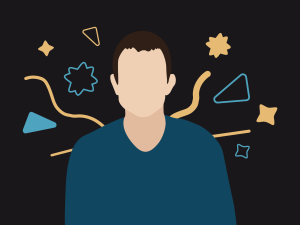
March 19, 2024
Eye to Eye founder David Flink is fighting the “just try harder” myth surrounding ADHD, dyslexia, and other learning and thinking differences.
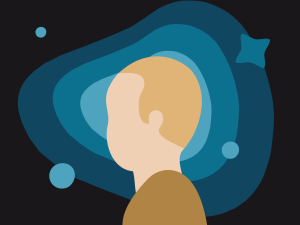
March 5, 2024
Peter Jones used to feel better saying he had a hearing problem rather than considering ADHD. Now, he knows he has ADHD and isn't afraid to say it.

February 20, 2024
Before her ADHD diagnosis, ADHD coach Emily Weinberg thought she was just lazy. But in reality she was stuck in “analysis paralysis.”
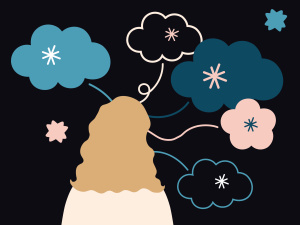
Carol Blumenstein was called an unteachable student. Now, she knows she has ADHD and dyslexia, and supports her five kids who learn differently, too.
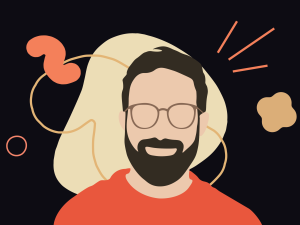
January 23, 2024
Executive coach, actor, and former criminal defense attorney Ernest Anemone shares his ADHD story — and why he questions the term “attention deficit.”

January 9, 2024
ADHD and post-traumatic stress disorder (PTSD) symptoms can look similar. And they can morph into what Hannah calls “a trauma ball of blame.”
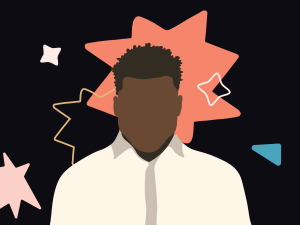
December 26, 2023
Livingston Steele was diagnosed with ADHD about a year into working at Understood.org. His experience and work have given him immense empathy for people with ADHD.
